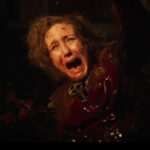When it comes to the greatest filmmakers of all time, Ingmar Bergman undoubtedly ranks near the very top. The iconic Swedish director created an unparalleled body of work over his long career, exploring deep philosophical and psychological themes with searing emotional intensity. For cinephiles, diving into Bergman’s filmography is a rite of passage – an unforgettable journey through the human condition guided by a true master of the medium.
Trying to narrow down Bergman’s best films to a list of 20 is no easy task, as he made so many stone-cold classics. But I’ve done my best to highlight the essential must-see Bergman movies that represent the pinnacle of his artistry. From his early breakthroughs to his metaphysical masterpieces, these are the 20 greatest Ingmar Bergman films.
20. Smiles of a Summer Night (1955)
This delightful romantic comedy set in turn-of-the-century Sweden proved Bergman could excel at lighter fare in addition to his trademark existential dramas. With a sparkling ensemble cast including Ulla Jacobsson, Eva Dahlbeck and Harriet Andersson, Smiles of a Summer Night is a witty and heartfelt look at the entanglements of love.
19. Secrets of Women (1952)
One of Bergman’s early explorations of marriage and infidelity, Secrets of Women follows four sisters-in-law who share stories of their marriages while their husbands are away. It showcases Bergman’s gift for writing complex female characters and creating emotionally charged chamber dramas.
18. Summer with Monika (1953)
Summer with Monika features a luminous performance by Harriet Andersson as a young woman who escapes her troubled home life for an idyllic summer romance. But reality eventually sets in, foreshadowing the harsher depictions of love Bergman would go on to make. It’s a poignant coming-of-age story shot with lyrical beauty.
17. Autumn Sonata (1978)
Bergman regular Liv Ullmann gives one of her most devastating performances as a neglectful mother confronted by her daughter (Ingrid Bergman) in Autumn Sonata. The two acting titans go head-to-head in emotionally brutal scenes that lay bare a lifetime of familial pain and resentment. Watching these two legends together is simply electrifying.
16. Shame (1968)
Set during wartime, Shame stars Liv Ullmann and Max von Sydow as a married couple whose relationship disintegrates amidst the trauma and paranoia of living under occupation. It’s a gripping and disturbing portrait of how external conflicts can tear people apart, with searing images of cruelty and moral decay.
15. The Magician (1958)
The Magician stars Max von Sydow as a traveling illusionist who may or may not have real supernatural powers. This slyly satirical film takes on themes of faith vs. reason, the role of the artist, and the slippery nature of truth. It’s a strange, atmospheric movie with an unforgettable performance by von Sydow.
14. Hour of the Wolf (1968)
One of Bergman’s most nightmarish and surreal films, Hour of the Wolf follows an artist (Max von Sydow) haunted by disturbing visions and dark impulses. Liv Ullmann co-stars as his pregnant wife in this unsettling descent into madness, which features some of Bergman’s most arresting and horrifying imagery.
13. The Virgin Spring (1960)
Inspired by a medieval Swedish ballad, The Virgin Spring is a brutal revenge tale about a father (Max von Sydow) who seeks vengeance for the rape and murder of his daughter. Winner of the Academy Award for Best Foreign Language Film, it’s a powerful and primal film that grapples with questions of faith, evil and the limits of forgiveness.
12. Scenes from a Marriage (1973)
Originally conceived as a six-part television miniseries, Scenes from a Marriage is an intimate epic chronicling the dissolution of a marriage between characters played by Liv Ullmann and Erland Josephson. Over the course of a decade, Bergman charts the couple’s journey from bitterness and recrimination to hard-won grace and understanding. It’s as emotionally raw and honest as any film ever made about love.
11. The Silence (1963)
Two sisters, one of whom is terminally ill, travel with the latter’s young son to a foreign country on the brink of war in The Silence. Regarded as one of Bergman’s most experimental and ambiguous films, it explores the inability to find connection or meaning in a godless world. Featuring stunning cinematography, it’s a challenging, open-ended work that leaves a haunting impression.
10. Cries and Whispers (1972)
Cries and Whispers depicts the final days of a woman (Harriet Andersson) dying of cancer, as her sisters (Liv Ullmann and Ingrid Thulin) gather at her bedside. Awash in crimson hues, this visually striking film delves into the sisters’ resentments, cruelties and failures to love one another. It’s a lacerating portrait of a family’s dysfunction, with searing performances from its lead actresses.
9. Through a Glass Darkly (1961)
The first of Bergman’s “Faith Trilogy,” Through a Glass Darkly centers on a young woman (Harriet Andersson) struggling with schizophrenia while on vacation with her family. As she descends into delusion, believing that God is speaking to her, the film asks probing questions about faith, reason and human connection. Andersson is heartbreaking in the lead role.
8. Winter Light (1963)
In Winter Light, a pastor undergoing a crisis of faith (Gunnar Björnstrand) counsels a suicidal parishioner while neglecting the needs of his mistress (Ingrid Thulin). Austere and intense, the film is a stark meditation on God’s silence and the difficulty of maintaining religious conviction in the face of suffering. It features some of Bergman’s most powerful dialogues wrestling with the biggest of metaphysical questions.
7. Fanny and Alexander (1982)
Bergman’s dreamlike family epic, Fanny and Alexander follows the title siblings as they grow up in a theatrical family in early 1900s Sweden. Lushly photographed and sumptuously designed, the film is both a nostalgic evocation of childhood wonder and an unflinching look at the darker aspects of family life. It’s a grand summation of Bergman’s career-long themes, and won four Academy Awards including Best Foreign Language Film.
6. Wild Strawberries (1957)
In Wild Strawberries, an elderly professor (Victor Sjöström) reflects on his life while traveling to receive an honorary degree. Through flashbacks, dreams and encounters with hitchhikers, Bergman explores the man’s regrets, fears and emotional isolation. Sjöström gives a phenomenal performance in his final screen role, imbuing the film with wisdom and melancholy.
5. The Seventh Seal (1957)
Bergman’s most iconic film, The Seventh Seal follows a medieval knight (Max von Sydow) who plays a chess game with Death while the Black Plague ravages the land. Packed with indelible images like the Dance of Death, the film grapples with weighty themes of faith, mortality and the silence of God. It established Bergman as a major international auteur and remains hugely influential.
4. Persona (1966)
A nurse (Bibi Andersson) caring for an actress (Liv Ullmann) who has gone mute begins to take on aspects of her patient’s personality in Persona, Bergman’s most avant-garde film. Boldly experimental in its style and structure, with fourth-wall-breaking effects, the film is a mesmerizing exploration of identity, duality, and the vampiric nature of artistic creation. It’s a major touchstone of modernist cinema.
3. Scenes from a Marriage (1973)
Over the course of several years, Scenes from a Marriage chronicles the dissolution and eventual tentative reconciliation of Marianne and Johan’s union. Featuring tour-de-force performances by Liv Ullmann and Erland Josephson, the film is perhaps the most honest and unsparing depiction of marriage ever put on screen. It’s emotionally grueling but ultimately cathartic, finding hard-earned grace in the mess of human relationships.
2. Cries and Whispers (1972)
Saturated in red hues, Cries and Whispers takes an unflinching look at the relationship between three sisters, one of whom is on her deathbed. Through flashbacks, Bergman reveals the bitter resentments, cruelties and failures of love that have defined their lives. With its bold color scheme, dreamlike structure and raw performances, it’s a visually and emotionally overwhelming film that cuts to the bone.
1. Fanny and Alexander (1982)
Bergman’s final masterpiece, Fanny and Alexander is a majestic family saga that doubles as a fond farewell to the cinema. Set in the early 1900s, it follows young siblings Fanny and Alexander as their comfortable lives in a theatrical family are upended by their mother’s remarriage to a cruel bishop. Magical and moving, the film is a rapturous celebration of the power of art, love and imagination in the face of life’s cruelties. It’s a fitting summation of Bergman’s career-long obsessions, and one of the greatest films ever made.
Exploring Ingmar Bergman’s filmography is a profound and transformative experience for any serious film buff. These 20 Ingmar Bergman best movies represent an artist grappling with the deepest questions of human existence with unparalleled insight, intelligence and emotional honesty. Watching them is like holding a mirror up to your soul – challenging, revelatory and unforgettable. That’s the power of truly great cinema, and the enduring legacy of a master filmmaker like Bergman.





